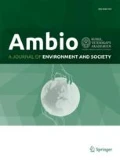Welcome to an exciting New Year with AMBIO! Special features to look out for this year include an article about severe accidents at large nuclear power plants with a particular emphasis on Fukushima 2011. This overview on the causes and impacts of nuclear accidents will likely attract as much attention as the article on oil spills written after the Deepwater Horizon accident in 2010 (Jernelöv 2010). Several articles will also highlight the impact of novel organisms, including invasive species, on the human environment.
The long-time reader of AMBIO may have noticed that in last year’s December issue a new article category appeared for the first time. Seitzinger et al. (2012) wrote the inaugurating “Perspective” in which they suggested that a key component of planetary stewardship is a global system of cities that develop sustainable processes and policies in concert with its non-urban areas. This open access article has created considerable interest among researchers world-wide and reflects the aims of the new article category in an excellent way. “Perspective” articles provide a forum for authors to discuss topical environmental issues, ideas, or models from a personal viewpoint. They are intended to evoke new ideas and stimulate debate. Papers that aim at bridging the gap between research and its implementation are particularly welcome. As a case in point please read this issue’s lead article “Science with society in the Anthropocene” by Roman Seidl and co-authors (2013).
More than 20 “Perspectives” have been submitted the last few months, and several of them will be published this year. There is a maximum word limit of 6000 words to allow authors to fully develop their arguments. Peer review of these submissions is even faster than normal, and at least one of the reviewers is a member of AMBIO’s experienced editorial board. This means that all articles in AMBIO are henceforth subject to peer review since the last article in the category “Synopsis” was published in the December 2012 issue.
The open call for research groups to submit thematic proposals for future special issues in AMBIO has been a great success! We received 20 proposals during the first 6 months after the announcement was made (Söderström 2012). This year three special issues will be published and you can look forward to learn more about a social-ecological approach toward sustainable forest management of European forest and woodland landscapes (March), a multi-disciplinary modelling approach to understand how radionuclides may migrate and expose humans and the environment from a potential release from a radioactive repository (May), and social-ecological solutions to manage marine fisheries under growing pressure (October).
During the next editorial board meeting in April 2013, we will decide on special issues to be published in 2014 and early 2015. Given the intense competition among different research groups to publish special issues in AMBIO, we recommend that you submit a detailed proposal including all relevant information and plan at least 12–18 months ahead. The basic requirements include a general introduction to the topic and its significance to research on the human environment, a list of article titles (even better if preliminary abstracts are available), names of lead authors, and when you wish to publish (more information can be found on AMBIO’s website: www.springer.com/13280).
We noticed an unsurprising trend of decreased download rates for articles appearing in issues published in June and July. Therefore, we have adapted our publication months to meet the needs of researchers: AMBIO will henceforth be published in February, March, April, May, and then again in September, October, November, and December.
Compared to many scientific journals, we still have quite a substantial number of print subscribers although most access our articles using the Internet. If you belong to the latter category, a new SpringerLink platform was recently launched to allow, among other things, a faster retrieval of articles (visit http://link.springer.com/journal/13280 to read and download AMBIO articles).
Finally, we would like to express our heartfelt thanks to all reviewers who provide excellent support to our associate editors by assessing the scientific quality of submitted manuscripts; among these, we can now for the first time include reviewers from the Peerage of Science service (see Söderström 2012).
Please continue to submit your best work to AMBIO!
Bo Söderström
Editor-in-Chief AMBIO
References
Jernelöv, A. 2010. The threats from oil spills: Now, then and in the future. AMBIO 39: 353–366. doi:10.1007/s13280-010-0085-5.
Seidl, R., F.S. Brand, M. Stauffacher, P. Krütli, Q.B. Le, A. Spörri, G. Meylan, C. Moser, et al. 2013. Science with society in the Anthropocene. AMBIO. doi:10.1007/s13280-012-0363-5.
Seitzinger, S., U. Svedin, C.L. Crumley, W. Steffen, S.A. Abdullah, C. Alfsen, W.J. Broadgate, F. Biermann, et al. 2012. Planetary stewardship in an urbanizing world: Beyond city limits. AMBIO 41: 787–794. doi:10.1007/s13280-012-0353-7.
Söderström, B. 2012. Increasing access to your research published in AMBIO. AMBIO 41: 325–326. doi:10.1007/s13280-012-0293-2.
Rights and permissions
About this article
Cite this article
Perspective Articles and Special Issues in AMBIO. AMBIO 42, 1–2 (2013). https://doi.org/10.1007/s13280-012-0364-4
Published:
Issue Date:
DOI: https://doi.org/10.1007/s13280-012-0364-4

